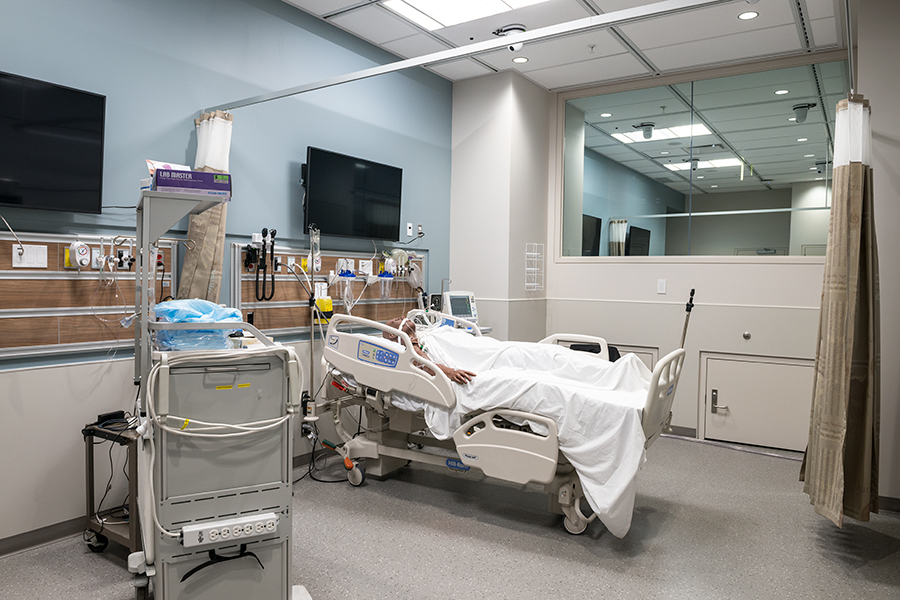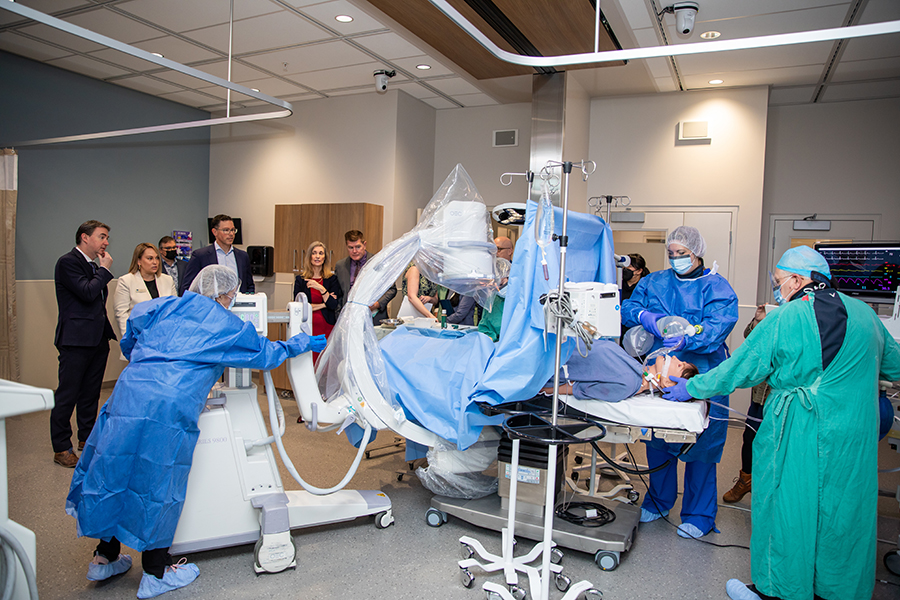$1.27M grant to be used to speed up product testing and development
It takes roughly 17 years for an idea for a new product to become a market reality, according to estimates by Alberta Innovates. In partnership with that government agency, NAIT is positioned to improve upon that with respect to health-care innovations that could affect the well-being of Canadians.
Kerri Oshust (Medical Radiologic Technology ’99), director of the polytechnic’s Centre for Advanced Medical Simulations (CAMS), says the facility and its staff can support the testing of new products – a need largely going unmet in Canada.
“Testing, refining and improving new health and medical technologies in simulated clinical scenarios is essential to patient safety,” says Oshust. “The Centre for Advanced Medical Simulation has the experience to build that bridge to bring new value to our health ecosystem.”
Alberta Innovates has recognized that experience with a $1.27M grant from its Health Innovation Platform Partnerships program to allow CAMS to expand services for product development for small and medium-sized businesses. NAIT has traditionally used the 6,000-square-foot facility for instruction and creating true-to-life clinical situations.
“The Centre for Advanced Medical Simulation is already a cutting-edge space for health-care teaching and training,” says Laura Jo Gunter, NAIT president and CEO.
“This funding enables us to open CAMS to innovators developing new and critical health technologies. It gives future health-care providers the tools they need to create better health outcomes for Alberta.”
Supporting local health innovators

The nine simulation theatres in CAMS can be used to mimic a variety of clinical and real-world settings to allow innovators to test and develop their technologies.
NAIT estimates that 172 small and medium health care-focused enterprises in Alberta alone could benefit from those spaces. One such company is Naiad Lab, a startup that specializes in virtual clinic development and remote monitoring of patients.
Naiad Lab participated in the pilot Health Innovation Platform Partnerships project at CAMS for which the polytechnic received $200,000 from Alberta Innovates in August 2021. That produced the market research and proof of concept that led to the $1.27-million grant, which will be used to ensure dedicated resources for the new endeavour.
Researchers at Naiad Lab worked with the team of NAIT staff, including researchers and simulation technicians, to test their MedROAD technology – a medical monitoring device that connects health-care providers with patients in remote locations.
“Our use-case simulations highlighted areas for improvement that we would not have flagged so early in our development,” says Talwinder Punni, Naiad Lab’s chief strategy officer.
“The testing enabled our team to narrow down our potential target market. This saved us time and financial resources, and we were able to pivot efficiently with our product.” says Punni.
“Resources like this simulation centre can single-handedly change the course of innovation and accelerate it. The same way the process of technology evaluation was accelerated for Naiad Lab, it will be accelerated for other innovations.”
“Unsung heroes” of health care

Innovators like Punni and her colleagues at Naiad Lab are the “unsung heroes” of the Alberta health and life sciences space, says Doug Schweitzer, Minister of Jobs, Economy and Innovation. He feels that investment in CAMS will help create new resiliency in the province’s health-care sector.
“Alberta has so much potential to lead the way in health innovation,” says Schweitzer. “Our health and life sciences sector has the talent and entrepreneurship to transform ideas into solutions and businesses that will benefit Albertans.”
In addition to offering resources, space and expertise to entrepreneurs, the team at CAMS hopes to provide support including the development of immersive training tools for products once they hit the market.
Oshust adds that they’re looking to expand beyond the Alberta market.
“Currently, a simulation service like the one we can provide in CAMS doesn’t exist in Canada. Many companies and innovators either have to wait to access real medical settings, or have to go to the U.S. to test their products.
“If we can successfully scale up to work with companies across the province and country,” says Oshust, “we’re adding value to our health ecosystem in ways that didn’t exist before.”
